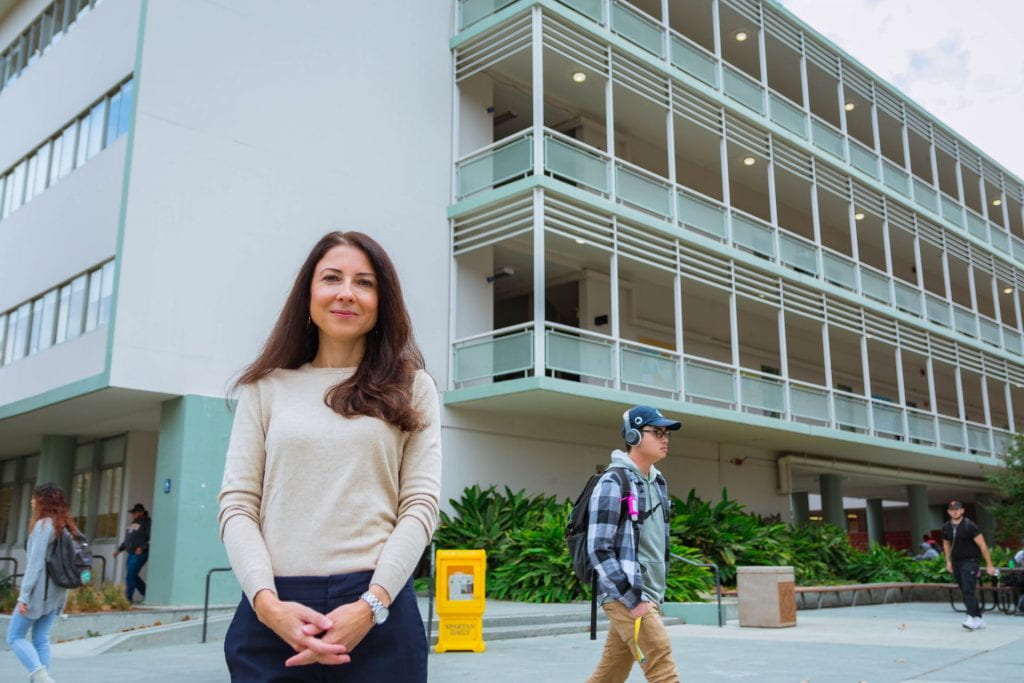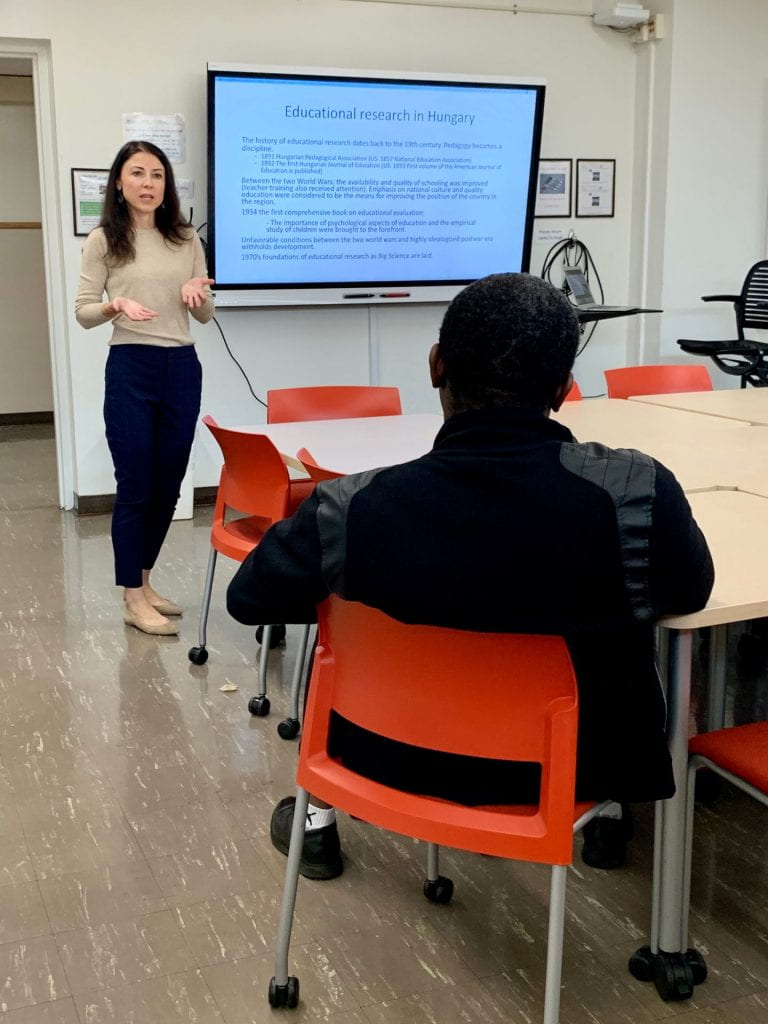During the Fall 2019 semester, the Lurie College of Education was fortunate to host Fulbright Scholar Ágnes Hódi, who is a member of the Juhasz Gyula Faculty of Education at the University of Szeged, Hungary. During her visit, she explored assessment practices in reading development in different text formats. Learn more about her experiences by reading her Fulbright Grantee Report below!
My Fulbright Visiting Scholar Program took place between August 19, 2019 and December 20, 2019, however, the successful completion of the objectives and proposed project activities required a careful planning and involvement of not only my host, Dr. Brent Duckor but other SJSU employees as well. Dr. Brent Duckor was an amazing Fulbright host. He consulted with me in professional matters every step of the way to pave the way for a fruitful in-person collaboration countless times months prior to my arrival. Furthermore, he was persistent in assisting me in preparing administrative issues by connecting me to SJSU staff. SJSU staff, Marie Kochevar, Parinaz Zartoshty, Mirabai Hutton and Khim Lok did everything to make my family’s transition and relocation as easy and hassle-free as possible. I owe a debt of gratitude to Brian Cheung Dooley for assisting me in the timely and precise preparation of the documents required for my project proposal. He also did an astonishing job in organizing my talk held at the faculty.
At the beginning of my project, Brent and I identified several objectives that were met successfully over the course of my time at SJSU. Among these were:
- Literature review, writing collaboration, and presentations on the reading wars (history of instructional practices to teaching reading in the US, their impact on learning and instruction and reading assessment).
- Literature review, writing collaboration, and presentations on currently used assessment instruments and programs in reading (Lexile, DIBELS, Smarter Balanced Assessment, PISA).
- Regular attendance and full-participation in the EDD 530, a graduate level course on Assessment, Testing and Evaluation in the Ed.D. Leadership program.
- Site Visit/Classroom observations in the Alum Rock Union and San Jose Unified School Districts.
Timeline of accomplishments
After being introduced at the Department of Teacher Education’s monthly meeting at the beginning of the semester by Dr. Patricia Swanson, I was able to connect with Dr. Allison Briceño (October 10) for a personal meeting. We shared a conversation on similarities and differences between reading instruction in Hungary and California. Furthermore, we discussed how reading instruction, assessment and development are embedded into SJSU’s teacher education modules.
Brent and I presented key findings from our “Reading Wars Revisited” project at an invited talk (October 15) sponsored by UC Berkeley’s Berkeley Evaluation and Assessment Research (BEAR) Center entitled “The reading wars through the NRC (2001) looking glass: Reflections on testing for reading and reading for testing in the 20th century”. The audience consisted of educational measurement faculty, postdoctoral scholars, and graduate students. The event lead to a rewarding exchange of ideas.
Dr. Agnes Hodi and I gave a talk today at UC Berkeley’s BEAR center on “The Reading Wars through the NRC (2001) Looking Glass: Reflections on Testing for Reading and Reading for Testing” today. See https://t.co/VHJYqweSXU pic.twitter.com/JAqG3IojV8
— Brent Duckor (@BrentDuckor) October 16, 2019
I also made a presentation on “International perspectives on reading assessment: The Case of PISA and Hungary” (November 14) at SJSU’s College of Education. The event resulted in an engaging conversation with Dr. Roxana Marachi (SJSU) and Dr. Robert Carpenter (EMU) about the role of educational technology in reading assessment and new forms of accountability. We agreed to proceed with this dialogue in the near future.
Later during the semester, Brent connected me to Dr. P. David Pearson, his former Dean at UC Berkeley’s GSE. Having an opportunity to engage in a professional conversation over lunch in Berkeley with one of the foremost literacy scholars, Dr. Pearson, helped me to engage in a deeper understanding of the “Reading Wars” (Pearson, 2004). It also made it possible for us to deepen our research on the new developments and assessment angles. This meeting offered a deep understanding of Dr. Pearson’s legacy, his take on past and current issues in reading assessment, and innovative assessment instruments such as ORCA and GISA that lie at the core of the literature review that is forming to be part of our paper. (We are currently drafting an article, provisionally titled “The Reading Wars Revisited: The Battle for Meaningful Assessment”, we wish to publish in the Journal of Educational Assessment Evaluation and Accountability or the Reading Research Quarterly.)
My regular attendance at the seminars held at the Berkeley Evaluation and Assessment Research Center established by Dr. Mark Wilson, who my colleagues in Europe hold in high esteem, has dramatically shaped my understanding and knowledge of the development and use of appropriate assessment methods for evaluating students, schools, and educational policy. Meeting with Dr. Wilson and Dr. Yukie Toyama helped me to see how readability as a composite index of passage, task and reader influences reading difficulty and how explanatory item response models are used to explore the interaction between these factors. Dr. Wilson’s feedback (and later an in-person meeting with Dr. Toyama on her dissertation on reading research) paved the way for adding further dimensions to our research topic. We are using these connections to shape a presentation proposal at the most significant educational annual meeting in Europe, EARLI SIG held in June, 2021. Having a common research interest with Dr. Toyama also enabled us to explore mutually beneficial potentials in a future collaboration on reading assessment and measurement issues.
I am indebted to Dr. Bradley Porfilio for having approved my regular attendance and full-participation at the EDD 530 course on Assessment, Testing and Evaluation in SJSU’s doctoral program. EDD 530 was a highly professional course that merged assessment theory and practice. Brent’s multifaceted knowledge and passion about the topic encouraged me to further explore key concepts and look at assessment instruments we’ve developed in Hungary with a critical eye. The invited experts (Dr. Larry Cuban from Stanford and Dr. Richard Patz formerly CMO at ACT) enabled us to deeper engage in different aspects of the covered topics. The final EDD 530 project, a co-presentation entitled “Developmental Reading Assessment (DRA2)” allowed me to cooperate with principal Joseph Bosco in exploring the strengths and weaknesses of a diagnostic reading assessment instrument that he and his colleagues regularly use for students’ reading development in Foothill Elementary School. The collaboration enabled me to gain an insight into a principals’ duties, responsibilities and take on current issues in public education while seeing how Joe must navigate the world of reading products and services. Participation in the course, collaborative discussions and group work with members of Cohort 5 made an invaluable contribution to my professional development.
Dr. Agnes Hodi #fulbright presents on reading assessment with doctoral student and Foothill Elementary school @saratoga_usd principal Joe Bosco @SJSU @sjsulurie in our EDD 530 course. Both explored the theory of cognition & construct domains for the DRA instrument pic.twitter.com/64WwzsyMuR
— Brent Duckor (@BrentDuckor) December 16, 2019
I am extremely grateful to Brent for connecting me with Dr. Lorri Capizzi, a colleague of his on the GEAR UP project. Lorri did an outstanding job of organizing site visits and classroom observations in the Alum Rock Union and San José Unified School Districts. The day required a lot of effort and meticulous planning on their behalf. In the John Muir Middle School (SJUSD – https://muir.sjusd.org/) we consulted Carol Chen, Assistant Principal – Curriculum & Instruction and Melissa Urbain (LA ELD / ALS 6-8) – both former SJSU students – about assessment and intervention policies in reading. Dr. Capizzi and I also had a chance to carry out literacy classroom observations. Carol and Melissa are doing an amazing job on a daily basis. They are equipped with the knowledge and skills to shape students’ lives on a never-ending journey they passionately embarked upon when finishing their studies at the Lurie College of Education. My visit in the L.U.C.H.A. (ARUSD – https://lucha.arusd.org/) and meeting the principal, Mrs. Burt and kindergarten teacher, former lecturer at SJSU, Judith Schierling, introduced me to alternative, community-centered educational directions that make an attempt to empower students, united with invested parents and families, to build social, academic, and personal achievement while developing into conscientious leaders. It was a deeply impactful and transformational day.
One of the highlights of my Fulbright experience was a meeting with Directors and staff at the California Department of Education (CDE) organized by Brent. We traveled to Sacramento to better understand reading assessment and standards-based instructional frameworks that support readers as part of the new accountability system. It was clear from this meeting that CDE and California educators work together to ensure equitable access and opportunity for all students to achieve the Common Core State Standards. Directors and representatives from the Curriculum Frameworks and Instructional Resources Division, the Improvement & Accountability Division, and the Educator Excellence and Equity Division were at our meeting. These policy leaders described the initiatives and measures CDE has been implementing under the ESSA for K-12 students’ literacy development. Information about “the Dashboard”, including the use of CAASPP assessment instruments, evidence-based intervention programs to support literacy improvement, the ELA/ELD Framework development and revision process, particularly how they relate to the California Teaching Performance Expectations, offered many new insights for fruitful comparisons between educational policies (and teacher training practices) pertaining to reading instruction and assessment in the U.S. and Hungary.
— Brent Duckor (@BrentDuckor) November 18, 2019
All things considered, I had a highly successful Fulbright experience at SJSU. I would like to express my gratitude for the professional support and warm welcome I received during my stay at SJSU. It surpassed all my expectations. I truly hope that I will have a chance to continue the stimulating discussions with more College of Education and TED faculty.

